Baku. 19 May. REPORT.AZ/ Leading online and print media representatives of the world are demanding regulation of activities of Facebook. In these days, this issue was the main topic of discussion at European Newspaper Congress in Vienna. European media captains have expressed serious concerns about Cambridge Analytica data scandal, UK based company that hijacked data on up to 87M Facebook users.
"Facebook" creates a social gap in society
Founder of European Newspaper Congress Johann Oberauer focused on the importance of Facebook's regulation during his speech: “This social network also acts as a media representative. Today, the digital world liberates many people from prohibitions. Online, print media, as well as radio and television, do not allow the insults on social networks to be published. Cambridge Analytica scandal has confirmed something that the media has been trying to prove for many years. "Facebook" is a threat to the system of values which paves the way for spreading of insults " He accused Mark Zuckerberg of just thinking about making a profit and benefiting from people: "In fact, the task of social networks should be to unite people. But they create a social gap and every day more people are driven into this abyss."

President of the German Federal Agency for Civic Education (bpb) Thomas Krüger touched upon the transparency of Facebook algorithms: "Facebook" promises a world that provides communication to people, but the fact that everyone think they're right creates social tension. Therefore, it is important to regulate these issues. On the other hand, although this social network is a global project, it is ultimately a US project and, therefore, it should not seem surprising that the country's executive authorities have access to the entire base."

Chairman of the Board of Management (CEO) of German company Bayer AG Werner Baumann said for the welfare of society, large companies choose long-term strategy but in social networks only daily topics are spreading rapidly: “In a chaos created by social networks, everyone wants to shout loudly on any subject and people not follow the opinions of professionals but those whose voices are louder. Unfortunately, politicians are now working on the data that arises on media and social networks and refuse to build a long-term strategy for people's welfare”.
"Facebook" and "Google" – destructors of media revenues
Editor-in-Chief of the new Tamedia Editorial Office in Switzerland Arthur Rutishauser stressed that, advertising market of the company, led by the development of social networks, fell by 35 percent.
Member of the Management Board at Hubert Burda Media Holding Philipp Welte said that research on general media advertising market shows that Google and Facebook have control over 40 percent of the European media market.

Austrian political scientist and journalist, news director of the TVstation PULS 4 Corinna Milborn called on the media to unite in the fight against Facebook: “This social network monopolizes and takes more than it gives. Therefore, we need to start a fight for a common ad market. "Facebook is trying to seize the share of traditional media organizations". He noted that European media organizations are fighting each other for the advertising market, but they easily submit their content to Facebook free of charge.
Germany's Managing Director of DvH Medien GmbH (DIE ZEIT, Handelsblatt, Tagesspiegel) weekly newspaper, Rainer Esser, expressed support for Facebook and underlined that as a result of a good business model, operating within the social networking laws it achieved breakthrough in terms of earning profit: “It's our problem that people spend more time on Facebook, not on our news portals. We have a lot to learn from them, and we have to work harder to return some of Facebook's revenues”.
Commenting on Facebook's commentary on television's advertising budget, he said that TVs had a larger amount of advertising budget than print media. While commenting on Facebook's share in advertising budget of TV channels he said that, in the past, TVs grabbed bigger share in advertising budget of print media.
R. Esser said Facebook and Google provides up to 30% of Internet traffic and cooperation with them is crucial.
Notably, 'European Newspaper Congress-2018' brought about 500 media representatives together. In total, 47 people from leading media outlets made reports on 31 themes.


 https://static.report.az/photo/8b6e0151-f047-4d2f-894b-fc5f626044e1.jpg
https://static.report.az/photo/8b6e0151-f047-4d2f-894b-fc5f626044e1.jpg

